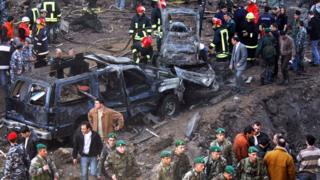 Image copyright
Getty Images
Image caption
The blast that killed Rafik Hariri left a scene of devastation in downtown Beirut
Image copyright
Getty Images
Image caption
The blast that killed Rafik Hariri left a scene of devastation in downtown Beirut
One of four men accused of killing a former Lebanese prime minister in Beirut in 2005 has been convicted by a special UN-backed court.
Salim Ayyash and the others, all from the Shia militant group Hezbollah, had been on trial in absentia since 2014.
The killing of Rafik Hariri, one of Lebanon's most prominent Sunni Muslim politicians, caused outrage across the country.
The verdict comes at a time of deep political crisis in Lebanon.
Ayyash was found guilty of conspiracy to commit a terrorist act, murdering Hariri, murdering 21 others and attempting to murder 226 more in the suicide car bombing on 14 February.
The judges said evidence showed Ayyash had possessed one of six mobile phones used by the team which assassinated Hariri.
The billionaire businessman and politician's killing was a watershed moment for Lebanon and gave rise to rival alliances that shaped Lebanese politics for years afterwards.
Alongside Ayyash, the three other defendants - Hussein Hassan Oneissi, Assad Hassan Sabra and Hassan Habib Merhi - were acquitted by the Special Tribunal for Lebanon (STL), based on the outskirts of The Hague in The Netherlands.
A fifth man - Mustafa Badreddine, the commander of Hezbollah's military wing - was dropped from the indictment after he was killed in Syria in 2016. Prosecutors had described him as "overall controller of the operation" to assassinate Hariri.
The presiding judge, David Re, also said there was no evidence that Hezbollah's leadership nor one of its patron's, Syria, were implicated in the attack.
Hezbollah had consistently denied any involvement and none of the men - whose whereabouts are unknown - have come forward.
The long-awaited verdict comes at a particularly precarious time for Lebanon.
It was delayed by the devastating blast at Beirut port two weeks ago, which led to the resignation of the government, already embattled by months of protest over the collapsing currency and high unemployment.
The country's economic crisis was made all the more worse by the impact of the coronavirus pandemic.

 5 years ago
673
5 years ago
673 

